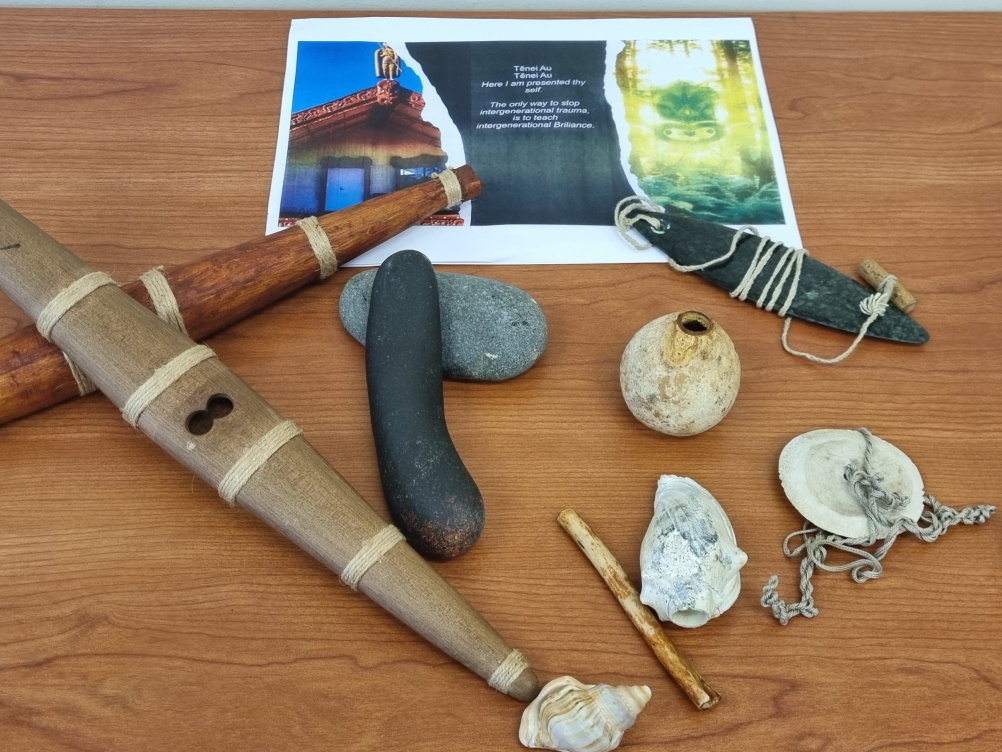Tēnei Au, Tēnei Au
 When staff at Hawke’s Bay Regional Prison went to meet the facilitators who will be running Tēnei Au, Tēnei Au – the new approaches for men in high security, they were given a glimpse of what the men will experience when they take part in wānanga.
When staff at Hawke’s Bay Regional Prison went to meet the facilitators who will be running Tēnei Au, Tēnei Au – the new approaches for men in high security, they were given a glimpse of what the men will experience when they take part in wānanga.
Tēnei Au, Tēnei Au has been developed in partnership with Ngāti Kahungunu Iwi Inc and will be delivered by Ki Te Whei Ao an iwi mandated provider.
As the facilitators started their presentation, they played taonga puoro (traditional Māori instruments) and then gently introduced the story of Tāne-nui-a-Rangi (god of forests and birds) and his ascent to the heavens seeking the three baskets of knowledge.
“It took me by surprise. It was so different from anything I have seen in this job,” says Prison Director Leonie Aben.
“I could have been sitting at a marae, or even relaxing in a paddock. I thought to myself how positive this will be for the men. I don’t know how anyone could walk into an environment like that and not feel a sense of calm.”
Tāne’s search for the three baskets of knowledge angers his brother Whiro who believes that as the tuakana (older brother) the job should be his. He tries many ways to stop Tāne succeeding.
Using pūrākau (stories) as a way of an encouraging and enabling the men in the wānanga to talk and question the challenges in their life is a feature of Tēnei Au, Tēnei Au.
“They might ask which atua (deity) you identify with and why? In this pūrākau, Tāne is trying to achieve for the good of everyone, and Whiro is throwing all these challenges his way,” says Leonie .
“For me, the approach resonated with the current situation – trying to do things differently, using a te ao Māori perspective. It made me stop and reflect and I thought ‘if that is what it will do for the men as they go through all the different pūrākau it will be … wow’.”
Tēnei Au, Tēnei Au is what Senior Advisor Kaupapa Māori Practice Heston Potaka refers to as 100% kaupapa Māori, and it’s fair to say that he’s excited that implementation is about to start.
“I’ve got this 110% belief that it's going to work. I've worked in the treatment space for more than 15 years, mainly working with clinical models and approaches in our standard treatment programmes. When I was a practitioner, I would weave kaupapa Māori into my clinical work. But this has givenus the opportunity to have kaupapa Maori as the foundation of the approach , it’s 100% Māori, and that's just gold.”
While Tēnei Au, Tēnei Au is the Māori Pathways equivalent to programmes elsewhere in Corrections – there are significant differences in both the way it was developed and designed, and how it will operate. While most programmes start off with a start and end date, and a set content, Tēnei Au, Tēnei Au has no start or end date – men stay for as long as they need, and there’s more flexibility about what will be covered in the regular wānanga.
Its design was led by a pukenga (group of academics and practitioners) who whakapapa to Ngāti Kahungunu and were selected by NKII.
NKII Chief Executive Chrissie Hape says it is humbling that the pukenga accepted the tono (request) and gave their whakaaro and expertise so willingly for whānau.
“I also thank Ki te Whei Ao for their input, faith and perseverance to the kaupapa and delivery of Tēnei Au Tēnei Au on behalf of Ngāti Kahungunu Iwi Inc and more importantly whānau. Ngā mihi nunui ki a koutou katoa ngā rangatira.”
Heston says the pukenga has provided a lens on the latest research done in Māori trauma informed care and principles of tikanga.
“It was a great privilege to work with them on this. They have years of experience and expertise and academic practice. I had read their research for many, many years, but never ever met them,” says Heston.
“The approaches will be steeped in Ngāti Kahungunu mātauranga (knowledge), values and history – they do not lean on the traditional clinical practices that are usual throughout the department. There may be deep seated topics, that may have been sitting there generationally. In Ngakau Ora, the Trauma Informed Care, it’s not just the trauma you've experienced in your life, but it's about the past. That's intergenerational trauma and other things that may have happened in history.”
Tēnei Au, Tēnei Au encompasses three new Māori Pathways approaches for men in high security at HBRP – Ngakau Ora (Māori Trauma Informed Care), Tikanga a Iwi (Tikanga Programme), and Wānanga (Kaupapa Māori programme for High Security) which centres around wellbeing. It starts at the prison at the beginning of November 2021.

